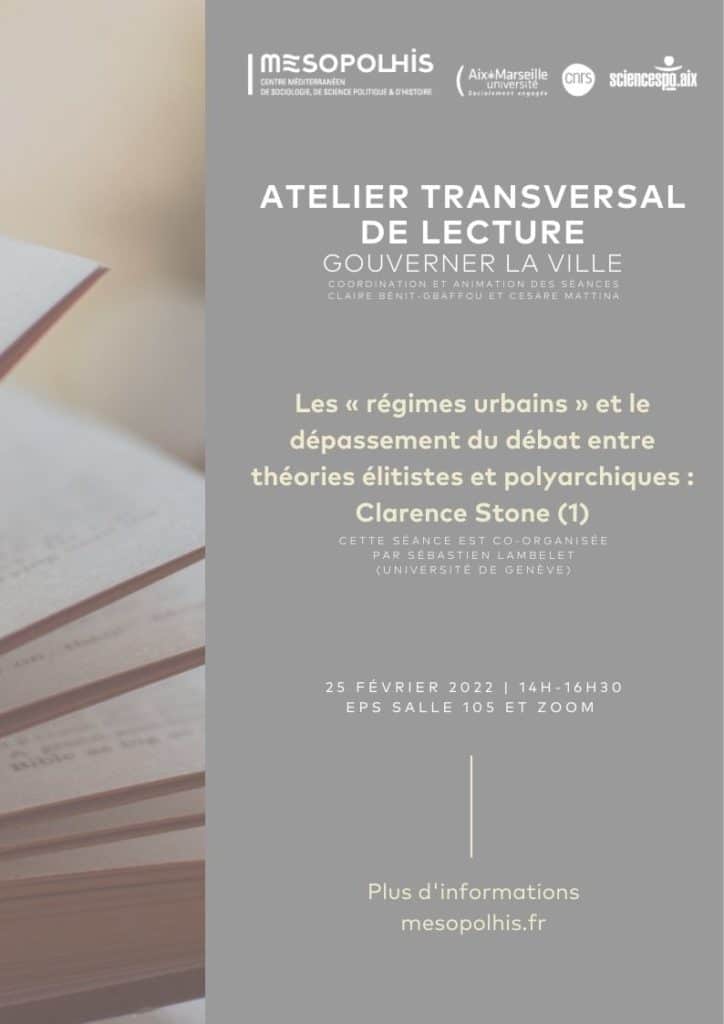Cross-disciplinary reading workshop
Governing the city
Details
Urban regimes" and overcoming the debate between elitist and polyarchic theories: Clarence Stone (1) Coordination and moderation of the sessions :
Details
Urban regimes" and overcoming the debate between elitist and polyarchic theories: Clarence Stone (1)
Session coordination and moderation: Claire Bénit-Gbaffou and Cesare Mattina This session is co-organised by Sébastien Lambelet (University of Geneva)

We are continuing our reflection on 'Governing the city', based on classic American texts and the debate between elitist and polyarchical theories of power in the city, with a reading of Clarence Stone's work on 'urban regimes'. His famous reference work (Regime politics: Governing Atlanta, 1946-1988, Kansas University Press, 1989) empirically studies the continuities and ruptures of Atlanta's government over a long period of time. In it, Stone shows that despite a demographic and political change that saw the rise of black populations in urban society and in the municipality, urban policies remained unfavourable to the black working classes and focused on the logic of urban growth. It is by questioning this a priori paradoxical continuity that Stone develops his theory of 'urban regimes', showing why so-called 'development' urban policies (centred on the pursuit of economic development and land reclamation), while not automatic, are those most frequently found at the centre of cities' political agendas, driven by government coalitions made up of public and private players with 'preemptive power'. This power is built up by mobilising resources that enable them not only to gain access to power, but also to maintain it by developing the capacity to govern in the long term: a 'power to do' and not just a 'power to influence' (power over).
Text 1
Stone C, 2006, "Power, Reform,
and Urban Regime Analysis", City &
Community 5:1, p 23-38.
We had already touched on Stone's thinking in a previous workshop, in a text from 1988 ('Preemptive Power: Floyd Hunter's "Community Power Structure" Reconsidered'), which returned to Hunter's work. We continue our discussion of this 'pre-emptive power' by fleshing it out in an explanatory text (2006), and an empirical text taken from Regime politics (1989). A third, more theoretical text, dating from 1993, allows Stone to set out both his position in relation to polyarchical theories of power, and to move up in generality, moving away from the case of Atlanta to propose a typology of urban regimes that will become a landmark.
The aim of this article is to clarify and synthesise Stone's thinking following the many debates sparked by his work. It usefully sets out some of his key concepts (power to/power over, the notion of preferences and their fluidity, the question of urban policy reform), and is a good introduction to his more theoretical writings. NB: the concept of the 'urban regime' is little developed here (see the 1993 text).
Text 2
Stone C, 1993, "Urban Regimes and the Capacity to Govern: a political economy approach",
Journal ofUrban Affairs, 15(1), pp. 1-28
Recommended extracts: pp. 1-9 then 17-28. This much-quoted article presents both the theory of urban regimes (and their typology) and Stone's position on polyarchical theories of power. It provides an opportunity to expand on the previous article, and to move up the scale of generality and abstraction.
Text 3
Stone C, 1989, "Chapter 8: Policy innovation and regime practice: An Atlanta overview", in Regime
Politics: Governing Atlanta (1946-1988), pp. 160-178
This chapter concludes the empirical part of Clarence Stone's seminal work. It presents a synthesis of the book and, in so doing, operationalises the key concepts in the author's thinking: the power of pre-emption, the governing coalition, resources and the development regime. And he explains why the quest for growth is neither automatic nor easily challenged.
See more
Timetable
25 February 2022 14 h 00 min - 16 h 30 min
Location
EPS 105
Event details online
Event has already taken place!